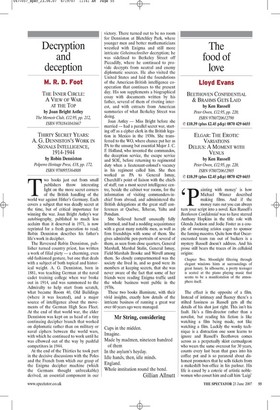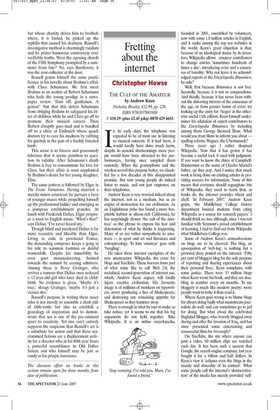The food of love
Lloyd Evans BEETHOVEN CONFIDENTIAL & BRAHMS GETS LAID by Ken Russell Peter Owen, £12.95, pp. 220, ISBN 9780720612790 £1039 (plus £2.45 p&p) 0870 429 6655 ELGAR: THE EROTIC VARIATIONS DELIUS: A MOMENT WITH VENUS by Ken Russell Peter Owen, £12.95, pp. 220, ISBN 9780720612905 £1039 (plus £2.45 p&p) 0870 429 6655 ainting with money' is how Michael Winner described making films. And if the money runs out you can always turn your script into a novel. Ken Russell's Beethoven Confidential was to have starred Anthony Hopkins in the title role with Glenda Jackson and Jodie Foster as a couple of swooning aristos eager to sponsor the fuming maestro. Quite how that Oscarencrusted team ran out of backers is a mystery Russell doesn't address. And his prose still bears the traces of its celluloid origins: Chapter Two. Moonlight filtering through elegant windows hints at surroundings of great luxury. In silhouette, a pretty teenager is seated at the piano playing music that seems to be a manifestation of the atmosphere itself.
The effect is the opposite of a film. Instead of intimacy and fluency there's a stilted fussiness as Russell gets all the details of his shot just right. This isn't his fault. He's a film-director rather than a novelist, but reading his fiction is like watching a film being made, not like watching a film Luckily the wonky technique is a distraction one soon learns to ignore and Russell's Beethoven comes across as a perpetually skint curmudgeon who wears the same overcoat for 30 years, counts every last bean that goes into his coffee pot and is so paranoid about dishonest promoters that he sells tickets from a makeshift box-office in his parlour. His life is eased by a coterie of artistic noblewomen who cosset him and call him 'Luigi' but whose chastity drives him to brothels where, it is hinted, he picked up the syphilis that caused his deafness. Russell's investigative method is charmingly random and he prizes humorous controversy over verifiable truths. Were the opening chords of the Fifth Symphony prompted by a summons from fate? No, says Beethoven, it was the rent-collector at the door.
Russell grants himself the same poetic licence in his novella about Brahms's affair with Clara Schumann. We first meet Brahms as an acolyte of Robert Schumann who hails the young prodigy in a newspaper review. 'Hats off, gentlemen. A genius!' Not that this deters Schumann from obliging Brahms to safeguard his litter of children while he and Clara go off to promote their musical careers. Then Robert abruptly goes mad and is bundled off to a clinic at Endenich where quack doctors try to cure his madness by rubbing his genitals in the guts of a freshly bisected lamb.
This scene is so bizarre and gruesomely hilarious that it seems pointless to question its validity. After Schumann's death Brahms is free to consummate his love for Clara, but their affair is soon supplanted by Brahms's desire for her young daughter, Elise.
The same pattern is followed by Elgar in The Erotic Variations. Having married a starchy minor aristocrat, he pursues a bevy of younger muses while propelling himself up the professional ladder and emerging as a pompous establishment grandee. At lunch with Frederick Delius, Elgar proposes a toast to English music. 'What's that?' says Delius. 'I've never heard any.'
Though blind and paralysed Delius is far more eccentric and likeable than Elgar. Living in exile in provincial France, the demanding composer keeps a gong at his side to summon footmen or dutiful womenfolk. Despite his immobility he even goes mountaineering, hoisted towards the summit by cursing admirers. Among these is Percy Grainger, who revives a rumour that Delius once seduced a 12-year-old girl who later died in childbirth. No evidence is given. 'Maybe it's true,' shrugs Grainger, 'maybe it's just a vicious slur.'
Russell's purpose in writing these saucy tales is not merely to assemble a slush pile of tittle-tattle but also to establish a genealogy of inspiration and to demonstrate that sex is one of the pre-eminent spurs to creativity. Yet one can't entirely suppress the suspicion that Russell's art is a substitute for action and that these sexcrammed fictions are a displacement activity for a director who in his 80th year bears a powerful resemblance to Old Father Saturn and who himself may be just as randy as his priapic batonistas.
The discount offers on books in this section remain open for three months from date of publication.






























































 Previous page
Previous page